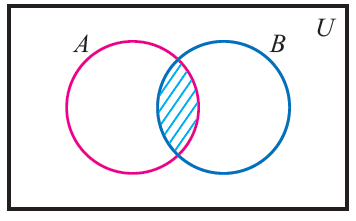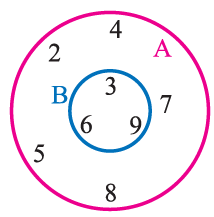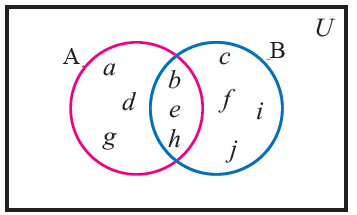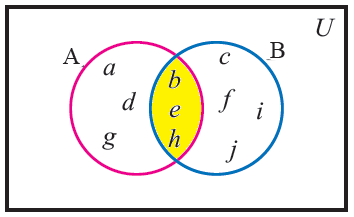Subscribe to our ▶️ YouTube channel 🔴 for the latest videos, updates, and tips.
VENN DIAGRAM FOR a INTERSECTION B
Here we are going to see how to draw a venn diagram for A intersection B.
To draw a venn diagram for A n B, we have to shade the common region that we find in both circles.
A n B

Let A and B be two sets.
Now, we can define the following new set.
A n B = {z | z ∈ A and z ∈ B}
(That is z must be in both A and B)
A n B is read as "A intersection B"
Now that A n B contains only those elements which belong to both A and B and the figure given above illustrates this.
It is trivial that that A n B ⊆ A and also A n B ⊆ B
Example 1 :
From the given Venn diagram find
(i) A (ii) B (iii) A U B (iv) A n B
Also verify that n(A U B) = n(A) + n(B) - n(A n B)

Solution :
The numbers inside the circle A are known as elements of set A.
A = { 2, 3, 4, 5, 6, 7, 8, 9 }
n (A) = 8
The numbers inside the circle B are known as elements of set B.
B = { 3, 6, 9 }
n (B) = 3
The numbers inside the circles A and B are known as elements of the set AUB.
A U B = { 2, 3, 4, 5, 6, 7, 8, 9 }
n (A U B) = 8
The numbers in common region of A and B is known as elements of A n B.
A n B = {3, 6, 9}
n (A n B) = 3
n(A U B) = n(A) + n(B) - n(A n B)
8 = 8 + 3 - 3
8 = 8
Hence it is proved.
Example 2 :
From the venn diagram, write the elements of set A n B

Solution :

The variables in common region of A and B are known as elements of A n B.
A n B = { b, e, h }
Example 3 :
If n(A) = 12, n(B) = 17 and n(A U B) = 21, find n(A n B)
Solution :
By using the formula,
n(A U B) = n (A) + n (B) - n (A n B)
we may find the value of n (A n B)
21 = 12 + 17 - n (A n B)
21 = 29 - n (A n B)
n (A n B) = 29 - 21 ==> 8
Hence the value of n (A n B) is 8.
Related topics
- Venn diagram A U B
- Venn diagram A n B
- Venn diagram of A'
- Venn diagram of B'
- Venn diagram of (AUB)'
- Venn diagram of (AnB)'
- Venn diagram of A\B
- Venn diagram of B\A
Subscribe to our ▶️ YouTube channel 🔴 for the latest videos, updates, and tips.
Kindly mail your feedback to v4formath@gmail.com
We always appreciate your feedback.
About Us | Contact Us | Privacy Policy
©All rights reserved. onlinemath4all.com

Recent Articles
-
Digital SAT Math Problems and Solutions (Part - 4)
Feb 20, 26 05:55 AM
Digital SAT Math Problems and Solutions (Part - 4) -
Digital SAT Math Problems and Solutions (Part - 3)
Feb 20, 26 05:37 AM
Digital SAT Math Problems and Solutions (Part - 3) -
Digital SAT Math Problems and Solutions (Part - 2)
Feb 19, 26 07:14 PM
Digital SAT Math Problems and Solutions (Part - 2)


